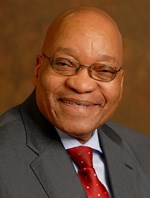






The hour-long address at the Union Buildings' southern lawns - billed as the drum-up to the second decade of democracy - highlighted a chain of achievements by government since 1994, and challenged South Africans to take pride in these achievements.
Earlier in the day, political parties present at the event gave speeches in support of the country's freedom and democracy, while committing themselves to strengthening the country's democratic institutions.
"We achieved the elimination of apartheid colonialism and institutionalised racism and replaced it with a new society founded on human rights, equality, justice, dignity, peace and stability," Zuma told the gathering, which was broadcast on national television.
"Together, we affirmed the assertion of our wise and forward looking forebears, who stated in the Freedom Charter that South Africa belongs to all who live in it, and that no government can justly claim authority unless it was based on the will of all the people," said Zuma.
He used the speech to call on South African society to join government in its economic transformation and the implementation of programmes to fight poverty and inequality and to alleviate unemployment.
Zuma conceded that the gap between white and black households, for obvious historical reasons, remained wide as revealed by Census 2011, with white households earned six times more than black households.
"The transformation of ownership and management of the economy continues," he said.
"It is encouraging that over R600bn of black economic empowerment transactions have been recorded since 1995. Another success story is that the number of black people and women in senior management has increased from less than 10% in the 1990s to over 40% today."
The President reintroduced South Africans to the achievement of government since 1994.
The RDP housing programme had built over three million housing units since 1994.
The percentage of households with access to potable water had increased from 60% to over 90%. Access to electricity had increased from 50% of households to approximately 80%.
Zuma said while income inequality remained high, the expansion of social grants system from 2.7 million people in 1994 to 16 million currently had contributed to a significant reduction in the proportion of households living in poverty.
The further extension of basic services required the public service to be more efficient, effective and caring in order to make people's experience of government a pleasant one.
"There are many achievements on the economic front as well. The South African economy has expanded by 83% over the past 19 years. The national income per capita has increased from R27,500 in 1993 to R38,500 in 2012, which is an increase of 40%. Disposable income per capita of households has increased by 43%. Total employment has increased by more than 3.5 million since 1994."
Zuma spoke in detail about equality and gender parity, saying this would ensure that freedom was felt by everyone across society.
He spoke of healing and resilience as he acknowledged that the country had a long way to go in eliminating the triple manifestations of the apartheid legacy - poverty, inequality and unemployment.
"(We) reaffirm our belief that political freedom must be accompanied by economic freedom as the next phase of liberation. The economic wealth of the country must bring about fundamental social change in the lives of all, especially the youth, the poor and the working class."
He further recommitted his government to the fight against crime and corruption by reporting that in 2010, South Africa established the Justice, Crime and Prevention Security Cluster's Anti-Corruption Task Team to fast-track high priority and high profile corruption cases. The team works with government departments to strengthen governance systems, reduce risks and prevent corruption.
By the end of December 2012, criminal investigations were initiated against 237 persons by the task team and 21 staff members within the criminal justice system were convicted.
A total of 718 persons are currently under investigation for corrupt activities. Freezing orders to the value of more than R1bn have been obtained.
SAnews.gov.za is a South African government news service, published by the Government Communication and Information System (GCIS). SAnews.gov.za (formerly BuaNews) was established to provide quick and easy access to articles and feature stories aimed at keeping the public informed about the implementation of government mandates.
Go to: http://www.sanews.gov.za